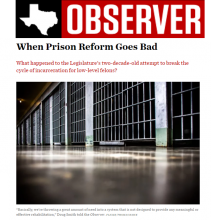A new state law set to take effect in March aims to combat the crime by making sexually oriented businesses post human-trafficking hotline information in their bathrooms.
Alternatives to Incarceration
[2019 Session] Eliminate False or Misleading Jury Instructions That Lead to Excessive and Disproportionate Sentences
Policy Background
When someone is convicted of a felony offense by a jury in Texas, the jury receives a statutorily required statement regarding the possibility of parole and how “good time” credits (credits for good behavior and attempts at rehabilitation) might be applied to reduce the person’s length of incarceration.1 These instructions contain false and misleading information for a significant proportion of people convicted of felonies.
[2019 Session] Address the Root Causes of Commercial Sexual Exploitation Rather Than Punishing Vulnerable Populations
Policy Background
Without the demand for purchased sex there would be no prostitution – and, in turn, no sex trafficking. To take steps to reduce prostitution and trafficking, we must deter the purchase of sexual services. Although some measures are currently in place to criminalize prostitution, there are glaring disparities in policing and criminal justice responses to buyers and sellers. Specifying that the offense of purchasing sex is a form of exploitation can be effective in reducing its demand.
[2019 Session] Reduce Harsh Penalties for Driving with an Invalid License
Policy Background
Currently, “Driving While License Invalid” (DWLI – a suspended license) is a fine-only Class C misdemeanor unless it is a person’s subsequent offense, in which case it becomes a Class B misdemeanor, warranting up to six months in jail and a $2,000 fine.
[2019 Session] Reduce the Penalty for Low-Level Marijuana Possession to a Class C Misdemeanor or Civil Penalty
Policy Background
Currently in Texas, possession of up to two ounces of marijuana is a Class B misdemeanor, punishable by up to six months in jail and a $2,000 fine.
[2019 Session] Fix the Bail System: Stop Punishing Poverty and Allow Safe Pretrial Release for Eligible Individuals
Policy Background
Bail is not intended to be a punishment; its intended purpose is to ensure that people appear for their court date. But in communities across Texas, people who are legally innocent are being held in jail – sometimes for months, risking job loss, eviction, and custody of their children – because they cannot afford to post bail; taxpayers foot the bill for their incarceration, their food, and their medical care.
[2019 Session] Overhaul Texas’ Failed State Jail System
Policy Background
Texas’ state jail system was originally intended to divert people with nonviolent drug and property offenses from crowded prisons and instead offer them rehabilitative services in localized facilities, followed by community supervision. However, because the state did not adequately fund rehabilitative services, the 8,000 people in state jails today have extremely limited access to treatment and programming options, and typically have no post-release supervision.
[2019 Session] Divert People from the Justice System Altogether and Provide Them Treatment in the Community
Policy Background
In 2017, more than 800,000 people were arrested in Texas – 147,000 for drug violations alone.1 According to the Texas Health and Human Services Commission, low-income people with substance use disorder must wait weeks for intensive residential treatment, outpatient treatment, and Medication-Assisted Treatment.2 People in need of co-occurring psychiatric and substance abus
When Prison Reform Goes Bad
Doug Smith, a senior policy analyst with the nonprofit Texas Criminal Justice Coalition, says lawmakers never delivered on the rehabilitation-focused approach they had promised. Without re-entry planning, ongoing mental health care and other rehabilitative programs, many formerly incarcerated Texans have little chance of reintegrating into society.
Texas inspired Washington’s prison reform plan. Ted Cruz isn’t convinced
“Any criminal justice researcher will tell you that the people who are least likely to [commit the same crime over again] are people who have committed violent crimes,” said Doug Smith, a senior policy analyst at the non-partisan Texas Criminal Justice Coalition who has studied Texas’ reforms.
Read the rest of this article at the Fort Worth Star-Telegram.


